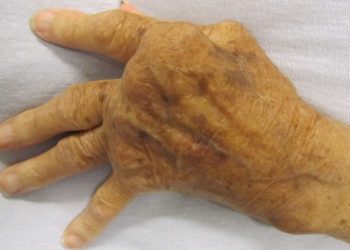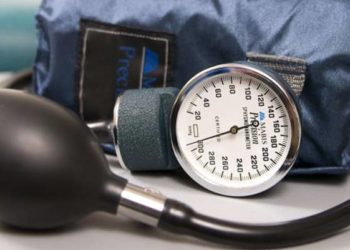[BMJ] Elevated rheumatoid factor associated with 26x risk of developing rheumatoid arthritis
Image: CC/James Heilman
Primer: Rheumatoid factors (RF) are autoantibodies directed against the Fc portion of immunoglobulin. Serum IgM RF occurs in 75-80% of patients with rheumatoid arthritis (RA); therefore, a negative result does not exclude the presence of this disease. IgM RF may also be detected in 5-10% of the healthy population. Population-based studies have shown that some healthy people with a positive RF develop RA over time. Retrospective studies have demonstrated that nearly 30 percent of those who later develop RA have serum RF present for a year or more prior to diagnosis. However, most asymptomatic persons with a positive RF do not progress to RA; as a result, measurement of RF is thought to be a poor screening test for future rheumatic disease.
This [prospective] study: Published in the British Medical Journal, a prospective cohort study hypothesized an association between elevated levels of RF and long term development of RA. Between 1981 and 1983, a baseline IgM RF plasma level was measured in white Danish individuals without RA participating in the Copenhagen City Heart Study and followed until 2010. A total of 9712 participants had plasma level measurements done in 2009-10, by which time 183 had developed RA. A doubling of RF levels increased the risk of developing RA by a factor of 3.3 (95% CI, 2.7-4.0, p<0.0001). After adjusting for tobacco use, BMI, alcohol use, sex, marital status, and level of education, those with the highest serum levels of RF (>100 IU/mL) had 26x the long term risk of developing RA compared to those with serum RF <25 IU/mL (95% CI, 15-46, p<.0001). A 32% absolute 10-year risk of developing RA, as a function of RF level, age, sex, and tobacco use, was found for 50-69 year old women who smoked and had RF levels >100 IU/mL .
In sum: There is a greater long term risk of developing RA in individuals who have elevated plasma levels of RF. This has implications on the current diagnostic guidelines, which don’t account for early elevated RF levels. The authors suggest that physicians consider early referrals for patients with elevated RF levels and no arthritic symptoms since RA therapy is more effective the earlier it is initiated. Additional effort should also be made to promote cessation of smoking among high risk women. However, this study was limited in that it only assessed white individuals and these results may not apply to other races.
Click to read the study in BMJ
© 2012 2minutemedicine.com. All rights reserved. No works may be reproduced without written consent from 2minutemedicine.com. DISCALIMER: Posts are not medical advice and are not intended as such. Please aee a healthcare professional if you seek medical advice.




